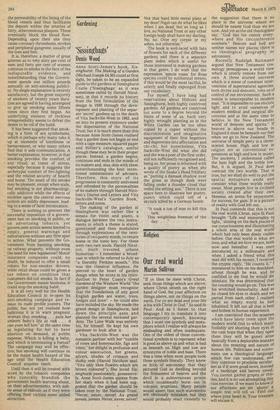Gardening
`Sissingbags'
Denis Wood
Anne Scott-James's book, Sissinghurst: The Making of a Garden (Michael Joseph £4.50) could at first sight, be taken to be an expanded guide to the gardens at Sissinghurst Castle ('Sissingbags' as it was sometimes called by Harold Nicolson), in that it records its history from the first formulation of the design in 1930 through the development and planting of the separate 'secret' gardens up to the death of Vita Sackville-West in 1962, and on into its present existence under the dispensation of the National Trust; but it is much more than this because Anne Scott-James realised that a garden does not begin or end with a tape measure, squared paper and Hillier's catalogue, useful though these may be in their proper places. Instead, a garden begins, continues and ends in the minds of its makers and, alas, dies with them notwithstanding the best intentioned ministrations of advisers. Therefore, this story of its progression is constantly enlivened and refreshed by the personalities of its makers through Harold Nicolosn's Diaries and Letters and Vita Sackville-West's 'Garden Book,' letters and notes.
The making of the garden at Sissinghurst was rather like a sonata for violin and piano, a dialogue between the two instruments in which a theme is stated, questioned and then modulates through explorations of the territories of two poetic minds, to return home in the tonic key. For these were two rare souls. Harold Nicolson, much travelled, urbane, humorous — I remember a broadcast in which he referred to July as "a Dorothy Perkins month." His was the classical influence. He pierced to the heart of garden design when he wrote in his introduction to Peter Coats's Great Gardens of the Western World "the garden designer must recognise that the foundations of any good English garden are water, trees, hedges and lawn" — he could also have included the sky. He made the grand design at Sissinghurst, laid down the principle axes and planned the several enclosed gardens. The Lime Walk was entirely his, for himself. He kept his own gardener to look after it.
Vita Sackville-West was the romantic partner with her "tumble of roses and honeysuckle, figs and vines," her delight in profusion and colour association, her greens, silvers, shades of crimson and dusky reds (Harold Nicolson said, "Vita only likes flowers which are brown coloured"). She loved Sissinghurst passionately, possessively. Anne Scott-James quotes from her diary when it had been suggested that the garden should be taken over by the National Trust, "Never, never, never! Au grand jarnais, jamais. Never, never, never!
Not that hard little metal plate at my door! Nigel can do what he likes when I am dead, but so long as I live, no National Trust or any other foreign body shall have my darling. No, no. Over my corpse or my ashes, not otherwise."
The book is well-laced with lists of flowers for each of the different gardens and there is a separate plant index which is useful for those interested in making gardens in that genre. I do wish that the expression *specie roses' for Rose species could by subliminal means, if this would be the most tactful, be utterly and finally expunged from our vocabulary.
For myself, I have long had reservations about Hidcote and Sissinghurst, both highly contrived gardens. All gardens are contrived but some to a degree beyond the limits of some of us. Such very highly wrought planting as in the White Garden can be too often copied by a copier without the discrimination and imaginative equipment of their first begetters and degenerate into affectation and chi-chi; but nonetheless, Vita Sackville-West did what she did and she was a poet of the first order, still not sufficiently recognised and, being se, her prose is informed with a quality of poetry as when she wrote of the Snake's Head fritillary as "putting a damask shadow over the grass as though dusk were falling under a thunder cloud that veiled the setting sun." There is not space here to illustrate her poetry, poetry Which could tell of a skylark killed by a German bomb:
"It took a ton of iron to kill this lark, This weightless freeman of the day. . . ."










































 Previous page
Previous page